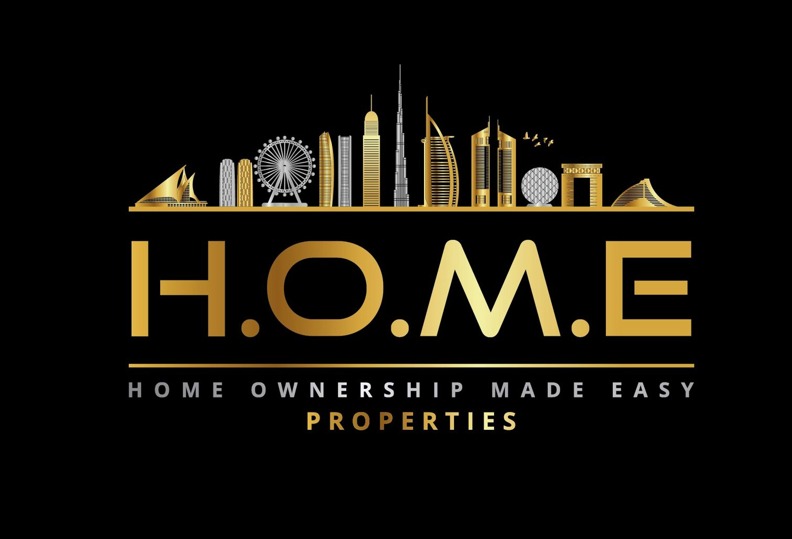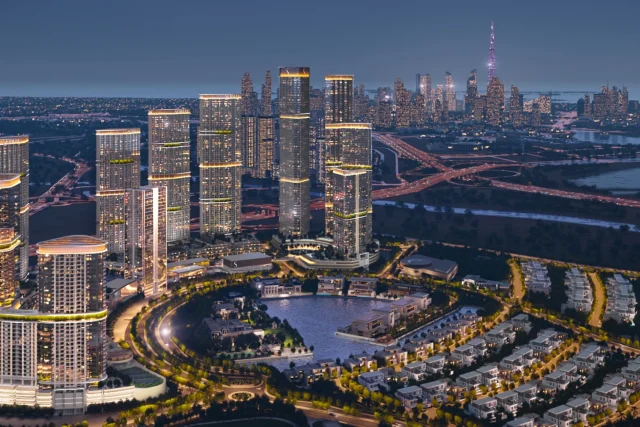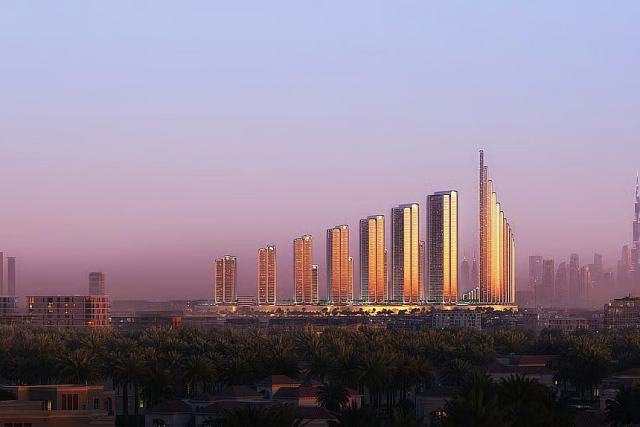
Dubai’s real estate is sizzling—and not just with local buyers. Big global investors—from Wall Street giants to sovereign wealth managers—are diving into the emirate’s booming property market. Let’s unpack who’s getting involved, what they’re investing in, and why Dubai is now a global hotspot.
1. 💼 Who’s Coming to the Table?
Dubai’s recent property rally—up about 70% over the past four years—is grabbing attention from heavyweight names :
- Brookfield Corp is eyeing a mixed‑use community in Dubai Hills, its first residential play in the region
- A Singapore-based property manager backed by Temasek Holdings is scouting investments across the city .
- Goldman Sachs and Hillhouse Investment have already deployed millions into Dubai real estate .
This marks a turning point—international institutions that once dismissed Dubai are now actively investing.
2. 📊 What’s Drawing Them In?
🔹 Record-Breaking Sales in Core Assets
In the past 24 months, Dubai saw eight office building sales—more than the previous decade combined—and 15 hotel transactions in 30 months .
🔹 Outstanding Yield and Value
Residential and BTR (build-to-rent) projects offer yields around 7–8%, far outpacing global markets.
Land plots in prime areas are delivering triple-digit returns.
🔹 Value Compared to Global Cities
Per‑sq‑ft costs in Dubai remain more affordable than in London, New York, or Singapore—yet with competitive ROI potential .
🔹 Strategic Infrastructure & Visa Policies
Mega projects like Dubai Hills, expanding suburbs, Golden Visa incentives, and new freehold zones are making the market highly attractive .
3. 🏗️ Latest High-Profile Moves
Here are some big name plays:
- Brookfield Corp is planning a landmark mixed-use development in Dubai Hills, building on its success with ICD Brookfield Place .
- Temasek-linked property manager is conducting due diligence on Dubai investments .
- Meanwhile, Goldman Sachs and Hillhouse continue their quiet accumulation of prime real estate .
Additionally, as UAE stock markets rebound, real estate names like Emaar and Aldar are leading gains—signaling renewed investor confidence .
4. 🌍 Why Now?
Several key trends are coinciding:
⚙️ Pandemic-Fueled Recovery
Dubai reopened early post-COVID, attracting global capital and ultra-high-net-worth individuals .
🧭 Visa Reforms
Golden visas, freehold expansions, and investor-friendly regulations are lowering entry barriers .
🧱 Infrastructure Boom
Dubai Hills, Al Maktoum Airport growth, and ultra-luxury towers (like One Za’abeel) are transforming landscapes .
💵 Institutional Confidence
With global investors eyeing higher-yield, lower-risk assets, Dubai offers a rare sweet spot .
5. 🔍 Market Implications
✅ Boost in Credibility & Liquidity
Big-name backers validate Dubai’s standing and inject capital—leading to deeper, more liquid markets.
✅ Rise of Build-to-Rent (BTR)
Institutional investors fund large residential communities tailored for long-term leasing—fulfilling rental demand.
✅ Portfolio Diversification
Investors balance their exposure globally—Dubai’s time zone and tax neutrality make it ideal.
✅ Competition Spurs Innovation
Majors will push demand for premium projects, but mid-tier and suburban segments will also get attention .
6. 👥 Bigger Picture: Global & Local
- Globally, Dubai is challenging traditional real estate hubs with competitive pricing + high returns.
- Locally, this shift elevates Dubai’s position as a highly credible and institutionalised market.
- Downside? Rising deliverables and macro pressures could temper growth late‑2025 into 2026.
7. 🧭 Tips for Buyers & Investors
| Type | Smart Moves |
|---|---|
| Retail Buyers | Look at BTR-backed projects for stable rental returns. |
| Institutional Investors | Target mixed‑use developments; leverage builder/institution projects. |
| Developers/Agents | Partner with global funds; raise standards to appeal to international buyers. |
| Retail Investors | Consider suburban/villa offerings in Dubai Hills or Jaddaf Waterfront. |
8. 🎯 Final Thoughts
Dubai is no longer just a hotspot for free-spending traders—it’s a strategic destination attracting serious global investors. With yield potential, infrastructure growth, and newfound credibility, it’s entering the big-leagues of real estate investment.
But success hinges on:
- Execution: Institutions need strong rental uptake and project delivery.
- Market balance: Avoid overbuilding and segment-specific oversupply.
- Adaptability: Developers must meet premium expectations in quality and tech.
Dubai real estate is evolving—from flashy tower speculation to a deeply rooted investment haven. And with Brookfield, Goldman, Hillhouse, Temasek, and more stepping up, the city’s skyline—and investor landscape—just got a whole lot more institutional ✨.





Leave a Reply